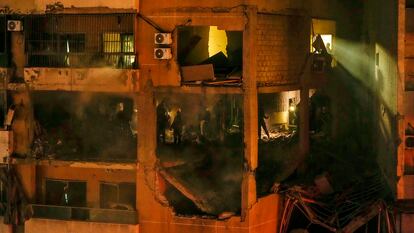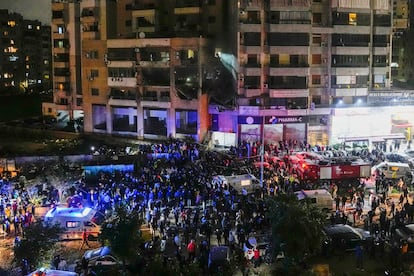Hamas confirms death of its deputy leader in Beirut blast
The Islamist militia has accused Israel of the attack against Saleh al-Arouri, co-founder of the organization’s armed wing. If confirmed, it would mark a major escalation in the war on Gaza

An explosion killed Saleh al-Arouri, Hamas’ second-in-command, in a neighborhood on the outskirts of Beirut on Tuesday afternoon. The Islamist organization accuses Israel of the attack in the Lebanese capital, but the government of Benjamin Netanyahu has so far not acknowledged responsibility. If confirmed, it would be the biggest Israeli military success since the start of the war on Gaza on October 7, eliminating the highest-ranking militant of the Islamist organization. It would also be the first Israeli attack on the Lebanese capital since 2006. According to Reuters, a missile launched from a drone killed him and two other leaders of the group’s armed wing. U.S. officials said Israel was responsible for the attack, according to The New York Times and The Washington Post.
Saleh al-Arouri, co-founder of Hamas’s armed wing, the Qassam Brigades, was a top aide to the organization’s leader, Ismail Haniyeh. His death comes amid talks between the two sides for a possible ceasefire and the exchange of hostages kidnapped by Hamas and Palestinians held in Israeli jails.
Nearing three months since the attacks that killed 1,200 Israelis and the start of the Israeli military response that has resulted in more than 21,000 deaths in Gaza, al-Arouri’s death would constitute a victory for the Netanyahu government, which — despite its land, sea and air siege of the Gaza Strip since October 7 — had not managed to capture or kill any senior Hamas leader. In fact, al-Arouri ranks higher than what Israel considers to be its number one target in the war, the Hamas leader of the Gaza Strip, Yahya Sinwar, and his lieutenant and local leader of the military wing, Mohammed Deif.
A native of a village near Ramallah, al-Arouri was also the head of the militia in the West Bank. His assassination has sparked protests in the center of the Palestinian capital. Lebanon’s Prime Minister Najib Mikati has condemned the blast as a “new Israeli crime” which, he said, seeks to implicate his country in the war. Hamas has confirmed his death in what it called “a cowardly assassination.”

The attack took place at Hamas offices in Musharafieh, one of the Beirut southern suburbs, which are a stronghold of the militant Hezbollah group. Since the war began, the Hamas ally in Lebanon has been exchanging almost daily rockets, aerial fire and artillery with Israel. In addition to the death of al-Arouri, the attack killed five other people, according to Reuters.
The Israeli army has refused to confirm responsibility for the attack. Mark Regev, advisor to Prime Minister Benjamin Netanyahu, assured the U.S. network MSNBC that Israel had not claimed responsibility for the attack. “Whoever did it, it must be clear that this was not an attack on the Lebanese state,” he said. “Whoever did this did a surgical strike against the Hamas leadership,” he added.
However, Danny Danon, from the prime minister’s party, has congratulated the army, the Israel Security Agency (Shin Bet), the national intelligence agency (Mossad) and the security forces “for killing senior Hamas official Saleh al-Arouri in Beirut.” “Anyone who was involved in the [October 7] massacre should know that we will get to him and settle accounts,” he posted on his X account, formerly Twitter.
Iran, for its part, has assured that the attack “will undoubtedly ignite another surge in the veins of resistance and the motivation to fight against the Zionist occupiers, not only in Palestine but also in the region and among all freedom-seekers worldwide,” according to a spokesman of its Foreign Ministry. The Tehran regime backs Hezbollah militias, like-minded groups in Syria and Iraq and Yemen’s Houthi rebels, who have stepped up their hostilities against Israel since the start of its offensive in Gaza.
Sign up for our weekly newsletter to get more English-language news coverage from EL PAÍS USA Edition
Tu suscripción se está usando en otro dispositivo
¿Quieres añadir otro usuario a tu suscripción?
Si continúas leyendo en este dispositivo, no se podrá leer en el otro.
FlechaTu suscripción se está usando en otro dispositivo y solo puedes acceder a EL PAÍS desde un dispositivo a la vez.
Si quieres compartir tu cuenta, cambia tu suscripción a la modalidad Premium, así podrás añadir otro usuario. Cada uno accederá con su propia cuenta de email, lo que os permitirá personalizar vuestra experiencia en EL PAÍS.
¿Tienes una suscripción de empresa? Accede aquí para contratar más cuentas.
En el caso de no saber quién está usando tu cuenta, te recomendamos cambiar tu contraseña aquí.
Si decides continuar compartiendo tu cuenta, este mensaje se mostrará en tu dispositivo y en el de la otra persona que está usando tu cuenta de forma indefinida, afectando a tu experiencia de lectura. Puedes consultar aquí los términos y condiciones de la suscripción digital.








































